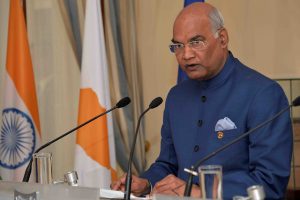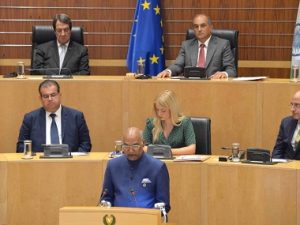
India and Cyprus have enhanced their security ties by singing two agreements, including a pact on curbing money laundering during the visit of President Ram Nath Kovind to the strategically located island nation in the Eastern Mediterranean region.
The pacts were signed after wide-ranging talks between President Kovind and his Cypriot counterpart Nicos Anastasiades in the capital Nicosia on September 3. The two sides discussed enhanced collaboration in the fields of IT and IT-enabled services, tourism, shipping and renewable energy. The major focus of the discussions was on deepening investment partnership. The two countries also explored prospects of joint development of blue economy.
“India was the fastest growing major economy in the world today with a growth rate of 8.2% last quarter, Mr. Kovind said.
“In this context and given Cyprus’ niche expertise in financial services and investment banking, both of us agreed that there was much scope to deepen our investment partnership,” he said in a statement.
President Kovind reaffirmed India’s unwavering support to Cyprus for upholding its sovereignty and territorial integrity.
Here is the text of President Ram Nath Kovind’s address to the House of Representatives of Cyprus.

“We live in a rapidly evolving world. The scale of change that we are likely to see in a decade or so will be unprecedented in human history. The world of technology, of start-ups, of innovations, of new ideas, of digital assistants, of clean energy and of pasta straws would re-orient our daily lives in an unbelievable manner. What is of deeper import is that perhaps for the first time in history, the youth is directly involved in bringing about sweeping changes and on such a massive scale. Yes, we did have young people participate in the Industrial Revolution but their energy and involvement cannot be compared to what we see today. Is there a correlation or is it just a co-incidence that when half the global population is below the age of 30, we are witnessing a youth-led digital revolution? Let’s leave that question aside for the time being. Youth by nature is open-minded, always ready to experiment with the new. The world over, they have taken to technology and are the principal drivers of the digital revolution. These changes present new opportunities to our youth but also several challenges. Since we are among students, let us first look at how the field of education itself is being impacted by these developments. Today, the tools available for learning have grown exponentially. Digital classrooms have made learning more inclusive and interactive. Students sitting across different continents engage in a classroom. The catchment area of ideas and cultures involved in education has grown manifold. Obviously, there is lot more imagination, thinking and involvement in solving problems. Chemistry today is not being taught with just books but with sounds, visuals and digital experiments. E-books and education apps have acquired a new salience. I understand that you are engaged in high-end research on energy and oceans at this university. Talk to your colleagues and you would know what meaning the new world of collaboration has added to their work.
Technology, indeed, has opened a whole new world of learning. And it has also made it easier to accomplish our tasks. You should, however, not get carried away by the instant-ness of technology. You must continue to work hard without the expectation of immediate reward. The pursuit of excellence should be the key factor that should dominate the minds of future generations. As we talk of digital progress, we must dwell on what the Fourth Industrial Revolution promises for us. To me, it would be a force multiplier for development and growth. Yes, it would disrupt conventional jobs – but with advances in artificial intelligence, life-sciences and energy management, many and more employment opportunities would be created. Digital platforms, robotics, and data analytics are going to impact not just business processes, human health, public mobility but also dairy production, agricultural productivity and forest conservation.
A whole new life awaits us. These changes would also impact social mores. We must shield our traditional social structure and family against these stresses. On one account, we have had positive experience. Technology growth has made students into new-age teachers. They are teaching the silver generation to download apps and enjoy the comfort of new-age products.
As we move towards a knowledge-based society, skilling and retraining will acquire center-stage of policy making and business development. In India, we have undertaken a massive programme to skill 150 million people over the next few years.We are also focused on making our educational institutions attain global standards. Recently, 6 educational institutions have been accorded the status of “Institution of Eminence” to help them become world class teaching and research centres. India has the third-largest scientific and technical manpower in the world with over 4000 doctorate degrees awarded annually. The patents filed by Indian Start-ups have gone up 15 times in 2017; from 61 in 2016 to 909 last year.
The changing world seeks greater collaboration among the global community. Despite its value, a digital classroom can hardly bring education for all, if mountain communities in India, rural folks in Cyprus or desert towns in Africa are left behind on the digital highway. As we move deeper towards the technology world, we must create open source platforms for communities and countries to access the fruits of science and technology. Access, equity and inclusion should remain key to developing and deploying technologies.
The Indian experience is of relevance in this context. Empowerment through digital access is an objective that the Government of India is committed to. “Digital India” is the world’s largest, technology-led transformative programme which is paving the way for our citizens to avail public services. Let me share a few examples of how digital technology is becoming a great facilitator for “ease of living” in India. Today, a farmer can access weather and rainfall information at the click of a button and accordingly decide on his cropping options. Digital technology is, therefore, contributing to increase farm incomes. A small entrepreneur can register on the Government e-Marketplace, and bid competitively for supply of goods. This leads to increased efficiency and greater value for public money. Our students avail the services of the National Academic Depository. This has allowed easy access of their certificates and awards. The process of seeking admission in schools and colleges has, thus, become simpler. And it is not that we have developed these technology platforms for just ourselves. We are equally committed to sharing them with those who need them. In this endevaour, we are guided by our age-old philosophy – “Vasudhaiva Kutumbamkam”, that is, the whole world is a family. We are making our space technology available for rural development in Madagascar and bringing the fruits of tele-medicine to many across the globe. As with the open space above us, the depths of our oceans also hold great promise. There are limitless possibilities that we can harness from Blue economy.
Cyprus has been a sea-faring nation for centuries. Time has come for us to explore our oceans and its depth, for science, sustainability and food. So far, I have talked of the opportunities before us. Now let us turn to some of the challenges. As I said earlier, more than half the population of this world is under the age of 30. In India, we have 65% of our people below the age of 35. This demographic trend calls for sustained growth so that there are enough jobs for our young people. Global growth engines must, therefore, continue to run, and run with speed. Greater trade, freer flow of finance and purposeful technology collaboration should define the path of international relations.A far greater challenge, however, for you would be how you manage Climate Change and the environmental stress. For the present generation, this challenge amounts to dealing with variability in weather patterns, flash floods and forest fires. The severity might be far more serious for our future generations. The problem is not insurmountable. By adding sustainability to development, by preserving forests, respecting ecology and by adopting clean energy options, we can tackle climate change. On this account, India has taken the lead through the International Solar Alliance.
As two ancient cultures, India and Cyprus have lived in harmony with nature for centuries. It is time for us to bring back our sustainable practices into our modern lives. New age technology combined with the wisdom of the past can solve many of our ecological problems.The world of Big Data has its own security risks. As we put our economy, our health and our education on-line, we cannot afford any degree of vulnerability. In times ahead, I foresee more active global cooperation and coordination to deal with cyber security.Our two countries have the greatest respect for each other’s leaders. We have the highest regard for Archbishop Makarios in India. He gave you freedom and pride to us. In less than a month’s time, on 2nd October, we will begin celebrating the 150th birthday of Mahatma Gandhi.”
Author Profile
- India Writes Network (www.indiawrites.org) is an emerging think tank and a media-publishing company focused on international affairs & the India Story. Centre for Global India Insights is the research arm of India Writes Network. To subscribe to India and the World, write to editor@indiawrites.org. A venture of TGII Media Private Limited, a leading media, publishing and consultancy company, IWN has carved a niche for balanced and exhaustive reporting and analysis of international affairs. Eminent personalities, politicians, diplomats, authors, strategy gurus and news-makers have contributed to India Writes Network, as also “India and the World,” a magazine focused on global affairs.
Latest entries
 DiplomacyJanuary 5, 2026India walks diplomatic tightrope over US operation in Venezuela
DiplomacyJanuary 5, 2026India walks diplomatic tightrope over US operation in Venezuela India and the WorldNovember 26, 2025G20@20: Africa’s Moment – The Once and Future World Order
India and the WorldNovember 26, 2025G20@20: Africa’s Moment – The Once and Future World Order DiplomacyOctober 4, 2025UNGA Resolution 2758 Must Not Be Distorted, One-China Principle Brooks No Challenge
DiplomacyOctober 4, 2025UNGA Resolution 2758 Must Not Be Distorted, One-China Principle Brooks No Challenge India and the WorldJuly 26, 2025MPs, diplomats laud Operation Sindoor, call for national unity to combat Pakistan-sponsored terror
India and the WorldJuly 26, 2025MPs, diplomats laud Operation Sindoor, call for national unity to combat Pakistan-sponsored terror







